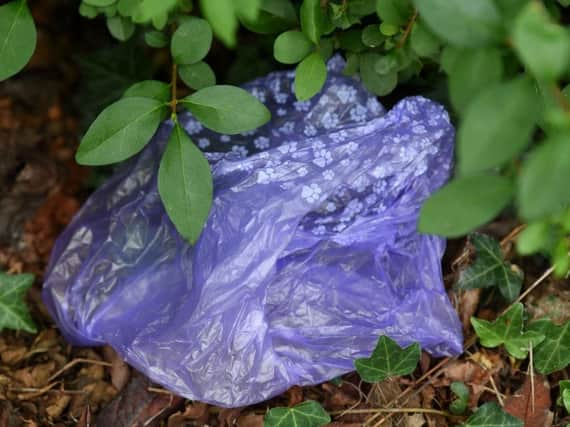Blackpool's two dog wardens have handed out just FIVE fines for 'unpleasant and nasty' fouling this year


That’s despite tough new measures being introduced through specialist powers to “help to protect our parks and open spaces against irresponsible dog owners who do not pick up after” their pets.
Some 253 reports of dog fouling have been filed with town hall bosses so far this year, but the resort’s two full-time wardens have handed out just five £100 fines, an investigation by The Gazette revealed.
Advertisement
Hide AdAdvertisement
Hide AdSeventy-five per cent of readers said they believe the council should make tackling the problem one of its priorities, while Coun Tony Williams, the leader of the opposition at the town hall, voiced his own concern at the figures, which showed there had been 1,860 complaints lodged since 2013 but just 76 fines.


He said: “The council needs to go back to school and figure out a better way of dealing with this.”
Blackpool Council said its wardens “co-ordinate complaints to prioritise where they might patrol and may reduce the number of incidents in the short term”, but said they are also responsible for investigating dog-on-dog attacks and dealing with strays.
The authority also said dog walkers who allow their pet to foul “do so where they believe they are not or cannot be witnessed”, making it difficult to catch them in the act.
Advertisement
Hide AdAdvertisement
Hide AdIt added: “Where council officers - not just dog walkers - are present and visible in the area incidents seldom happen and fouling is picked up by an owner.
“It is often likely that the level of fouling not collected is as a result of dogs being exercised at night in the dark or when the main dog walking routes are quiet.”
Councils across the north west have looked at a number of different tactics in recent years in a bid to tackle the scourge of dog fouling.
In Hyndburn in east Lancashire, council chiefs launched a radical ‘pooper snooper’ scheme, which saw amateur sleuths paid for taking pictures of guilty parties and reporting their details - with the first resident feeling their first collar not long after.
Advertisement
Hide AdAdvertisement
Hide AdNeighbouring Wyre Council considered DNA testing dog muck in a bid to trace it back to its shamed owner before later scrapping the idea.
It has since drafted in private enforcers who handed out 17 fines in a three-month period earlier this year. In contrast, council officers there have caught just 55 people in the past five years.
Council leader David Henderson said the authority wanted to have a visible deterrent and suggested other councils could follow suit – especially with the nights starting to draw in.
He said: “There’s nothing stopping any other councils doing exactly the same.
Advertisement
Hide AdAdvertisement
Hide Ad“Instances of dog fouling increase in winter because it goes dark quicker. People who have been approached use the excuse of, ‘I couldn’t find it’.
“We are hoping we can stop that because the wardens will be out there.”
Coun Henderson also said spraypainting dog muck in Wyre Estuary Country Park, in River Road, Stanah, led to a reduction in fouling, despite the authority getting “stick from ne’er-do-well soothsayers who asked if that’s all the council could come up with”.
He said he was insistent the council would not work with “anyone who could bring the council into disrepute, like dog wardens hiding behind bins”, and said: “I want the dog wardens to be walking down the street the way you can see them and you would think about it.”
Advertisement
Hide AdAdvertisement
Hide AdCoun Henderson said the council keeps full control over fines, including the appeals process, and said council’s small percentage of the income covers the cost of the scheme, which he said is “not a for profit way of doing things”.
South Ribble Council, which failed to hand out a single dog fouling fine last year despite launching a crackdown, also took to spraypainting muck orange to “bring people’s attention to this rather disgusting issue”.
Coun Caroline Moon said: “Dog owners must make sure they are cleaning up after their pets, but where they do not we will be using orange spray paint to bring people’s attention to it, in a bid to totally eradicate this unnecessary problem.
“While we will remove the dog fouling, the orange paint remains behind as a reminder to dog owners that someone has had to come out and clean it up for them.”
Advertisement
Hide AdAdvertisement
Hide AdCoun Martin Boardman, leader of the Conservative opposition at Chorley Council, which had double the number of dog wardens in 2006 than it does now and also failed to catch any foulers last year, said: “We have pulled the council up on this a considerable amount of times. The reason we get is that it’s difficult to enforce because they have to catch people in the act.
“We need men or women on the ground to do that and we are being told, because of the cuts, they have not got the staff to do that.”
He added: “The man on the street cares considerably about it. It’s the topic that every councillor gets complaints about. It’s the biggest topic I think - that and emptying the dustbins.
“What we are finding is local communities have started tackling the issues themselves.”
Advertisement
Hide AdAdvertisement
Hide AdVolunteers in Eccleston have created bag dispensers that are now dotted around the village, he said, while Mawdesley Parish Council have also invested in dispensers.
Blackpool Council said it has decided against bringing in a private enforcement company, saying it considers its current setup to be “satisfactory”, but said it was working with local group
Blackpool Association for Responsible K9s (BARK) to “promote responsible dog ownership”.
It did complete a year-long trial run with a private firm as part of a crackdown on littering in the resort, but that ended in 2017 with the council saying it had “not realised or resulted in the benefits envisaged at the outset of the scheme”, with almost 1,800 £100 fines handed out and not a penny of it going to the authority.
Advertisement
Hide AdAdvertisement
Hide AdCoun Gillian Campbell, the authority’s deputy leader, said: “We want Blackpool to be clean and tidy for both residents and visitors to enjoy. Dog fouling is so unpleasant and nasty and we are committed to pursuing irresponsible dog owners who appear not to care about our environment.
“To help in that drive for a better Blackpool we have created and promoted online and social media channels to encourage and make it easier for people to report dog fouling. This to some extent can explain the increase in number of complaints made to the council.
“Although we do have dog warden presence in the town it is often the case that a dog owner will clear up any mess when an officer is visible. It can also be that irresponsible dog owners may not be identified and detected because they are walking dogs at night in the dark or when the main dog walking routes are quiet.
“The local community are most likely to know who the offenders are. Information on when, who, time, description of the dog and owner are essential to help us successfully challenge irresponsible owners. This may not result in a fine but certainly will assist us in making people aware that they have been reported and hopefully this will lead to behaviour change.”
Advertisement
Hide AdAdvertisement
Hide AdAround 1,000 people took part in a Gazette poll asking whether the council should make dog fouling a priority, with 750 saying yes.
Paula Shallcross said: “I’m a dog owner on the Kincraig, Kilmory, Dumfries Estate and over the last year the amount of dog poo left by some dog owners is getting out of hand. We always clean up after our dog and it makes me so angry that others can’t do the same.”
Stephen O’Brien added: “Of course it’s a priority. What type of place do want to live in? And we want clean places for children to walk and play.”
Others argued there are more pressing issues, such as crime, social care funding, and homelessness.
Advertisement
Hide AdAdvertisement
Hide AdMichael Anthony said: “How about all the bike thefts? Gangs of children with knives? Social care? How about not pushing pensioners to the point they feel like jumping off a motorway bridge is the only way out?”
And David Holmes added: “Important? Yes. Priority? No. [There are] so many more important issues such as helping kids in care and updating the infrastructure to give the next generation some jobs.”